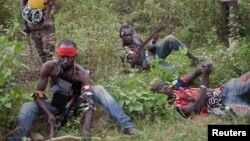BANGUI, CENTRAL AFRICAN REPUBLIC —
The Central African Republic's government is considering a plan to persuade anti-balaka militia fighters to leave the capital and return to their villages. International peacekeeping chiefs are skeptical about a proposal that might leave them in charge of large camps full of combatants.
Both the Seleka rebels who overthrew the president last year and the anti-balaka militias that drove back the Seleka are accused of massacring thousands of people and of widespread looting and destruction. At least 100,000 Muslims have fled the western C.A.R. in recent months as a result of sectarian violence led by the anti-balaka.
Some of the anti-balaka in Bangui came from the provinces late last year seeking revenge on the Seleka, or perhaps just wanting to loot the capital. The government wants to help them go home.
Transportation, farm tools needed
One government minister told VOA that anti-balaka seeking to leave will need transportation and farm tools.
And an anti-balaka coordinator who advises the government told the IRIN news service there is a plan to find a place where the anti-balaka can gather before going home.
Gilbert Kamizulai said he commands the anti-balaka militia in southern Bangui. He said he has asked that his group be immediately put in camps, then demobilized and helped to rejoin civilian life. And he also said they should receive amnesty. The papers are with the government, he said, but it’s taking time and they find themselves remaining in the field.
The plan probably will involve international aid donors. It also likely will involve the French and African Union peacekeeping missions to protect the demobilized militia.
Concerns abound
French commander General Francisco Soriano said this week he has concerns about the idea of putting the anti-balaka in camps.
As for the anti-balaka, he asked, who they are, and who is their chief? He said there needs to be a clear chain of command and a chief who has authority over them.
There also is the risk that a huge number of people could turn up at a camp and wait there for months, and then decide not to leave after all.
Some Seleka fighters have been cantoned in Bangui, but Soriano said that was possible because they have a chain of command and are identifiable.
Advocating for camps
Others in the international community , however, are more sympathetic to the idea of a camp for the anti-balaka.
They include the interim U.N. humanitarian coordinator in the country, Kouassi Lazare Etien, who wants the groups disarmed. Still, Etien said he recognizes the difficulty with the plan. Normally for disarmament to succeed, the armed group needs to be cantoned, he said, and the anti-balaka are spread out all over the country.
Such a plan is likely weeks, if not months, away from fruition. There are only about 2,000 French and 6,000 African peacekeepers in the country, although more European troops are due to arrive.
And money has been slow to arrive for any of the projects meant to restore order in the C.A.R., where hundreds of thousands have been displaced.
Both the Seleka rebels who overthrew the president last year and the anti-balaka militias that drove back the Seleka are accused of massacring thousands of people and of widespread looting and destruction. At least 100,000 Muslims have fled the western C.A.R. in recent months as a result of sectarian violence led by the anti-balaka.
Some of the anti-balaka in Bangui came from the provinces late last year seeking revenge on the Seleka, or perhaps just wanting to loot the capital. The government wants to help them go home.
Transportation, farm tools needed
One government minister told VOA that anti-balaka seeking to leave will need transportation and farm tools.
And an anti-balaka coordinator who advises the government told the IRIN news service there is a plan to find a place where the anti-balaka can gather before going home.
Gilbert Kamizulai said he commands the anti-balaka militia in southern Bangui. He said he has asked that his group be immediately put in camps, then demobilized and helped to rejoin civilian life. And he also said they should receive amnesty. The papers are with the government, he said, but it’s taking time and they find themselves remaining in the field.
The plan probably will involve international aid donors. It also likely will involve the French and African Union peacekeeping missions to protect the demobilized militia.
Concerns abound
French commander General Francisco Soriano said this week he has concerns about the idea of putting the anti-balaka in camps.
As for the anti-balaka, he asked, who they are, and who is their chief? He said there needs to be a clear chain of command and a chief who has authority over them.
There also is the risk that a huge number of people could turn up at a camp and wait there for months, and then decide not to leave after all.
Some Seleka fighters have been cantoned in Bangui, but Soriano said that was possible because they have a chain of command and are identifiable.
Advocating for camps
Others in the international community , however, are more sympathetic to the idea of a camp for the anti-balaka.
They include the interim U.N. humanitarian coordinator in the country, Kouassi Lazare Etien, who wants the groups disarmed. Still, Etien said he recognizes the difficulty with the plan. Normally for disarmament to succeed, the armed group needs to be cantoned, he said, and the anti-balaka are spread out all over the country.
Such a plan is likely weeks, if not months, away from fruition. There are only about 2,000 French and 6,000 African peacekeepers in the country, although more European troops are due to arrive.
And money has been slow to arrive for any of the projects meant to restore order in the C.A.R., where hundreds of thousands have been displaced.




